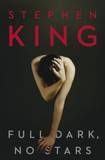Full Dark, No Stars / Stephen King
 Scribner / November 2010
Scribner / November 2010
Reviewed by: Vince A. Liaguno
“When it came to the dark fuckery of the human heart,” one of King’s characters muses as she descends into near-madness in this quartet of novellas, “there seemed to be no limit.” And when it comes to exploring all that dark fuckery of the human heart, no one seems to possess the limitless capacity for such more than Stephen King. Full Dark, No Stars – the legendary dark scribe’s third collection in the four-novella format following 1982’s Different Seasons and 1990’s Four Past Midnight – explores the frightening lengths to which we’ll go to maintain normalcy and the status quo. Matters of the conscience factor in heavily here, with every action causing a stronger (and deeply consequential) opposite reaction among a cast of archetypal King characters – here ranging from an early 20th-century farmer to a modern-day midlist writer to everyday husbands and wives.
The collection opens with “1922”, a lush period piece about the desperate choices we make, our struggle to restore order, and the ghosts that subsequently haunt us. Told within the narrative structure of a confession, “1922” introduces us to Nebraska farmer Wilfred James who, as the story opens, is fearful that his free-thinking wife may sell one hundred acres of adjoining land to a hog butchery. When reasoning fails, desperation kicks in and he enlists the help of his teenage son to protect their land and livelihood. Murder and cover-up are quickly eclipsed by a big ‘ole dose of ghostly karma from the grave (or well, in this case). King’s ability to balance horror and humanity is on fine display here as graphic images of otherworldly rodents blend seamlessly with a father’s recognition of his very human failings with his son. You can almost hear Frank Darabont typing away at the screenplay now.
In “Big Driver”, King once again embraces an old-favorite – the writer as protagonist. This time out, readers meet Tess, successful author of a series of chick-light mysteries about a bunch of old women sleuths who solve crimes within the framework of their knitting circle. Following a book club speaking engagement, Tess unwisely takes a shortcut home and runs afoul of the titular character in one of King’s most relentless, brutal stories. But just when the reader starts to slip into the hopelessness of the main character’s violation and circumstances, King infuses “Big Driver” with healthy shots of feminism and adrenaline and takes Tess from victim to vigilante in a thoroughly satisfying mash-up of I Spit On Your Grave and Death Wish. Not for the squeamish.
“Fair Extension” – the shortest of the quartet – is a straightforward deal-with-the-devil tale in which a terminally ill man meets the devil himself, here cast as a roadside vendor who specializes in selling extensions of all shapes and sizes. Envy truly is a green-eyed monster here as Dave Streeter identifies his best friend as the one person he hates in exchange for a life extension. The ensuing reversals of fortune and misfortune in the two men’s lives are at once horrifying and heartbreaking in this morality tale that ably compensates in punch for what it lacks in word count.
Rounding out the collection, “A Good Marriage” is perhaps King’s strongest exploration of husband-wife dynamics since Dolores Claiborne or Gerald’s Game. When a dutiful wife stumbles (literally) upon proof of her seemingly virtuous husband’s dark side, conscience battles loyalty and security. As Darcy Anderson’s sense of right and wrong and that fine line between them blurs and shifts, the story studies with subtle brilliance the power of human resiliency and survival and justification. Like life, it’s compromise – and our ability to be able to look ourselves in the mirror – that ultimately wins in the end.
Throughout Full Dark, No Stars, readers are treated to the usual bounty of King literary riches – from his keen insights into commonplace life events (such as when anagrammed antagonist George Elvid in “Fair Extension” refers to chemotherapy as “knee-jerk triage” in the case of that story’s terminally ill protagonist), gorgeous personifications (such as when “graveyards yawn” in “A Good Marriage”), and sentences so evocative as to simultaneously lull and induce gooseflesh (like “On most nights, the dark was her friend – sleep’s kindly harbinger – but not tonight” from “A Good Marriage”).
But it’s in his Afterword – comprised mainly of an unusually trite recap of where each idea that led to the stories the reader has just taken in came from – that King offers an added gem in what is perhaps the strongest, most concise distinction between literary and genre fiction:
“I have no quarrel with literary fiction, which usually concerns itself with extraordinary people in ordinary situations, but as both a reader and a writer, I’m much more interested by ordinary people in extraordinary situations. I want to provoke an emotional, even visceral, reaction in my readers. Making them think as they read is not my deal. I put that in italics, because if the tale is good enough and the characters vivid enough, thinking will supplant emotion when the tale has been told and the book is set aside (sometimes with relief).”
True to his word, King will coax strong reactions from the tales he puts forth in Full Dark, No Stars, — fear, apprehension, outrage, melancholy, to name a few — and leave the reader scarce time to sort out the literary viscera he packs into every story. It’s in that glorious digestion process afterward that one realizes that the bogeymen that haunt King’s fictional worlds are no slouches when it comes to substantive matters of the heart, the conscience, and the darkest depths of the soul itself.
Purchase Full Dark, No Stars by Stephen King.



